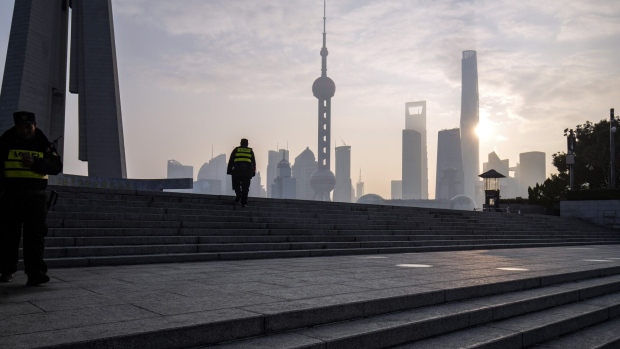Feb 28, 2024
China Tells Quant Funds to Phase Out Strategy Blamed for Turmoil
, Bloomberg News

(Bloomberg) -- Chinese regulators are taking steps to gradually shrink the size of a popular quantitative trading strategy that contributed to turmoil in the nation’s stock market this month, according to people familiar with the matter.
Some quantitative funds that manage “Direct Market Access” products for external clients were told to stop accepting new inflows and phase out their existing products, which typically use swap contracts and are often highly leveraged, the people said, requesting not to be named because they weren’t authorized to speak publicly. The gradual exit would help prevent drastic selloffs, the people said.
The guidance curbs a popular trade that enabled quant funds to boost returns in 2023 but was blamed for exacerbating a stock-market selloff this year. Such products stood at as much as 200 billion yuan ($27.8 billion) at the start of the year, according to estimates by hedge fund Shanghai Banxia Investment Management Center. The guidance was given over the past few days and may change, the people said.
In a statement late Wednesday, the China Securities Regulatory Commission vowed to strengthen the regulation of direct market access and guide funds in controlling the size and leverage of their DMA businesses. Brokerages and private funds recently “took the initiative” to reduce the scale of these strategies in an effort to help control market risks, according to the CSRC statement, which it said was in response to media reports.
The regulator added it will “severely crack down on illegal activities and maintain the smooth operation of the market.”
While regulators didn’t require funds to trim positions of existing products, according to the people familiar, the move fueled concerns over further selling. The CSI 2000 Index — a gauge of small caps favored by quants — dropped 6.8% Wednesday, the most since Feb. 5, snapping eight days of gains.
The move “reflects a continued drive to deleverage in the market, and affects sentiment across the board,” said Chen Zunde, fund manager at Guangdong Fund Investment Co. Ltd. Such deleveraging “could lead to an extended drop and might be a replay of the slump in January.”
Quants that use DMA for proprietary trades can continue with the strategy, though their leverage will be capped at one time the investment, the people said. China first started limiting the expansion of DMA products for some funds around November last year.
The size of the DMA business has declined since the market reopened following the Lunar New Year this month, with average daily volume accounting for 3% of total trading, according to the statement from the CSRC.
The DMA model allowed market-neutral stock products — those that balance bullish and bearish positions — to borrow as much as 300% of their investment from brokerages.
Earlier this month, China broadly reined in quant funds, which relied on computer-driven trading to outperform the market for much of the last three years. The group fell under scrutiny after being blamed for exacerbating a market slump. Some of the DMA products had earlier been barred from paring positions by regulators trying to stem the rout.
DMA services at securities firms, which allow clients to execute directly through brokerages’ trading desks, became a popular way for quants to add leverage to their market-neutral strategies after regulators tightened rules in late 2021 that effectively banned an earlier type of favored swap. While the model was initially used mainly for quants’ proprietary trades, more and more managers have been selling such products to clients to boost assets, Citic Futures Co. analysts wrote in a report in August.
The government’s forceful measures have helped prop up share prices at least temporarily. The benchmark CSI 300 Index has increased by nearly 9% since Feb. 2.
--With assistance from April Ma and Zheng Wu.
(Updates with regulator comment from fourth paragraph)
©2024 Bloomberg L.P.






